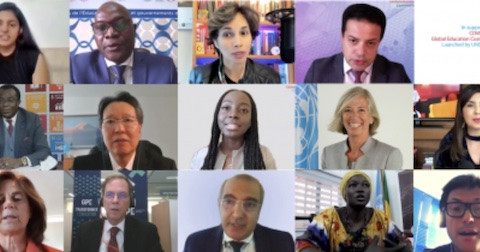
GCED Basic Search Form
Quick Search
You are here
News

New York, 29 September 2021: At the margins of the 76th session of the United Nations General Assembly the Permanent Mission of Japan to the United Nations and UNESCO organized a virtual event titled “Education and Technological Transformations for Human-centered Recovery”.
Heeding the call of the United Nations General Assembly to leverage the potential of technological transformations for quality, equitable and inclusive education, the Permanent Mission of Japan to the United Nations teamed up with UNESCO to organize a high-level dialogue at the sidelines of 76th session of the UNGA. Bringing together key stakeholders, the event highlighted the unprecedented technological changes in education, both as means to mitigate the negative impact of COVID 19 and as a trend to be reckoned with. It also explored opportunities to unlock the potential of the Global Education Coalition to recover and further promote SDG4 through innovative technological solutions.
Chairing the meeting, Ms Stefania Giannini, Assistant Director-General for Education of UNESCO, recalled the focus on reopening schools safely and brought the attention to the nearly 120 million learners who are still affected by school closures in 60 countries. In this context, she urged the international community to ensure access to distance and hybrid learning for all, including by providing devices and training teachers. She underscored the urgency to make education systems more adaptive and resilient to future shocks, with an aim to make technology work for inclusion, equity and quality in education. Recalling the ‘digital revolution happening during COVID-19 pandemic”, she informed that UNESCO and partners are working to launch a Declaration on connectivity and education. Recalling the importance of connectivity, teachers and gender equality, she emphasized the need to equip all students with digital skills as to also address exacerbated gender divides in access to technology. She further highlighted that teachers, as the most critical influence on learning, must be supported with professional development to be able to use technologies effectively.
H.E. Mr Tetsuya Kimura, Ambassador, Economic, Social and United Nations Management Affairs, Permanent Mission of Japan to the United Nations reminded that the pandemic accelerated the digital transformation globally as over half of the world’s population shifted to a new way of living and learning. Yet, he warned that the post-COVID increased reliance on digital solutions may pose certain risks – such as the potential exclusion of children without internet as well as further fragmentation of education systems worldwide. H.E. Mr Kimura also called for careful assessment of the changing roles and new skills required of teachers in hybrid learning systems, ensuring that their role in fostering children’s well-being and development are well played through technology. He stressed the need to invest in digital infrastructures and human resources which “requires both a ‘whole-of-society’ and a ‘human-centered’ approach.”
“I hope today that we will renew our global commitment to international cooperation and multilateralism in order to ensure the right to education, including access to the internet, information, and knowledge, which children, young people, and we ourselves all need to thrive in increasingly digitalized societies”, H.E. Mr Tetsuya Kimura said.
Moderated by Ms Victoria Ibiwoye, Founder and Director of OneAfricanChild Foundation for Creative Learning, the panel also featured participation of Mr Laurent Serge Etoundi Ngoa, Minister of Basic Education of the Republic of Cameroon, Ms Maria Victoria Angulo, Minister for Education of Colombia, Mr Charles North, Deputy Chief Executive Officer, Global Partnership for Education as well as key partners of the Coalition. Ministers underscored the sense of urgency and the rapid action taken by their governments to ensure the continuity of learning. In this context, they highlighted the importance of UNESCO’s support as they grappled with the challenges to keep schools functioning. More particularly, they referred to the establishment of the ImaginEcole platform, and the Global Skills Academy, which provided free high-quality online training to equip young people with skills for employability and resilience. Stressing the importance of sustainable financing, the GPE’s representative introduced the COVID-19 global grant called “Innovation for inclusion”, funded by a $25 million GPE grant, a consortium composed of UNESCO, UNICEF and the World Bank, that develops solutions for teaching and learning continuity with the potential to be scaled up globally.
Focusing on the need to produce technological change to achieve the Sustainable Development Goal 4, the second part of the event featured interventions by diverse members of the UNESCO Global Education Coalition. Panelists shared their experience in tapping on technological advances to ensure the continuity of education during the COVID-19 pandemic. They also addressed issues related to the lack of internet coverage in remote areas, the importance of training teachers on the use of technological devices, as well as the urgency of investing not only in infrastructure, but also in human and social capital, for students to acquire entrepreneurship skills that cannot be developed on self-directed learning platforms.
The Global Education Coalition launched by UNESCO is a platform for collaboration and exchange to protect the right to education during this unprecedented disruption and beyond. It brings together more than 175 members from the UN family, civil society, academia and the private sector to ensure that #LearningNeverStops. Coalition members rally around three flagships, namely connectivity, teachers and gender, as well as support specific causes including the educational recovery following the deadly explosion in Beirut. All Coalition members are encouraged to pledge for the protection of learners’ personal information, privacy and security. As the UNA STRENghtens and focuses on rapid technological coalition.
Click here to watch the recordings of the event.
URL:
